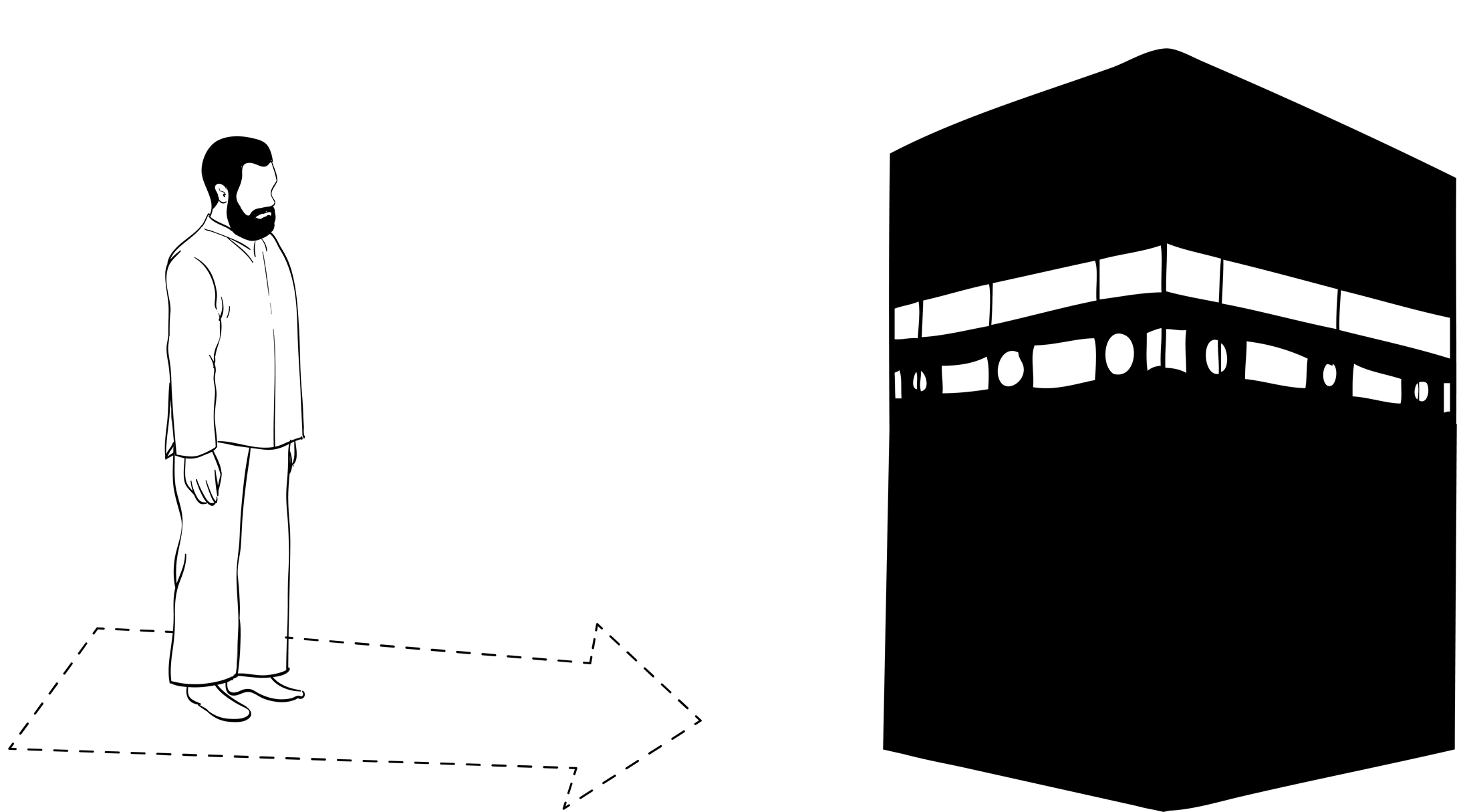
1. Standing Posture
• Saying aloud “Allahu Akbar” to declare entry into prayer.
• Recitation of Al-Fatihah or the Opening Chapter of the Noble Qur’an.
• Recitation of additional portion of the Qur’an.
1- Intend in your heart which of the five prayers you are going to pray, without uttering your intention out loud.
2- Stand with your whole body directly facing the Qiblah (direction of the Sacred Ka`bah in Mecca), without deviating to the right or left or looking away.

3- Raise both your hands to shoulder (or earlobe) level, with your fingers stretched upward and both palms facing outward toward the Qiblah, and say Takbirat-ul-Ihram (saying ‘Allahu Akbar [Allah is Greater]*’ upon starting prayer).
*Allahu Akbar, literally Allah is Greater, means Allah is far vaster, loftier, and more important than anything that may preoccupy, distract, or delay a Muslim from prayer.

4- Place your hands upon your chest, with your right palm resting over the back of your left hand.

5- Keep your gaze fixed on your place of prostration.
6- It is recommended that you recite Du`a’ Al-Istiftah (opening supplication when starting the prayer). This is not an obligatory act of prayer; rather, it is Sunnah (supererogatory act following the example of Prophet Muhammad, peace and blessings be upon him). The shortest and easiest opening supplication made by Prophet Muhammad (peace and blessings be upon him) is to say:
“Subhanaka Allahumma wa-bi hamdika, tabaraka asmuka, wa ta‘ala jadduka, wa la ilaha ghayruka (Glory and praise be to you, O Allah. Blessed be Your Name, and exalted be Your Majesty. There is no god but You.”

7. Seek Allah’s Protection from the evil of the devil, saying: “A`udhu-Billahi mina Al-Shaytan-ir-Rajim [I seek refuge with Allah from Satan, the accursed].”
8. Utter Basmalah (saying, “Bismillahi r-Rahmani r-Rahim [In the Name of Allah, the Most Gracious, the Most Merciful]” and recite Chapter Al-Fatihah.
1. Bismillahi r-Rahmani r-Raheem. In the Name of Allah, the Most Gracious, the Most Merciful. 2. Al-hamdu lillahi Rabbil `Alamin, Praise be to Allah, the Lord of existence, 3. Ar-Rahmanir-Raheem, The All-Merciful, the Ever-Merciful, 4. Maliki yawmi-d-Din. the Owner (Master) of the Day of Judgment. 5. Iyyaka na`budu wa-Iyyaka nasta`een. It is You (alone) we worship, and You (alone) we ask for help. 6. Ihdinas-siratal-mustaqim, Guide us to the Straight Path, 7. Sirata alladheena an`amta `alayhim, ghayri-l-maghdubi `alayhim walad-daalleen. the Path of those on whom You have bestowed Your Grace, not the path of those who have incurred Your Anger, nor of those who have gone astray.
Chapter Al-Fatihah [1: 1-7]
9. Upon completion of reciting Al-Fatihah say, “Amen” – which means “O Allah, please respond (to or accept my supplication).”
10. Recite whatever chapter or verses you have learned of the Qur’an.
1. Qul huwa l-lahu ahadun Say (O Muhammad): He is Allah, the One. 2. Al-lahu l-samadu The Self-Sufficient Master, Whom all creatures need. 3. Lam yalid walam yulad He begets not, nor was He begotten; 4. walam yakun lahu kufuwan ahadun and there is none comparable or coequal unto Him.
[Chapter Al-Ikhlas 1-4:112]


